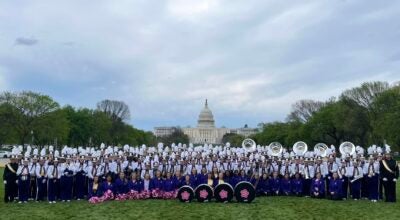Rayfield thankful for ‘No Child Left Behind’ waiver
Published 5:40 pm Friday, February 10, 2012
Decatur County School Superintendent Dr. Fred Rayfield said he was pleased to see that the state of Georgia recently was granted a waiver from the federal No Child Left Behind (NCLB) law.
On Thursday, President Barack Obama’s executive action freed Georgia and nine other states from the constraints of the 2001 law, which was initially signed by President George W. Bush. The main goal of the law was to ensure that U.S. students achieved 100-percent proficiency in math and science by the year 2014. However, critics of the law said it set unrealistic goals.
Under the waiver, schools will no longer be asked to meet “Adequate Yearly Progress” (AYP) benchmarks, which became stricter each subsequent year. According to the Center on Education Policy, about half of U.S. schools “failed” to make their AYP last year.
Rayfield noted that schools will still be held accountable under the new system, but feels the process might be a bit more fair.
“For example, let’s say that we had one sub-group improve their graduation rate from 30 percent to 60 percent,” he said. “Let’s also say that the AYP benchmark for that year is 70 percent. Under the old law, that school would have failed to make AYP; now, that school will get credit for moving 30 points in the positive direction.
“It’s got a built in component that allows us to measure growth and performance, rather than just ‘did you make AYP or not?’”
According to State Superintendent John Barge, the Georgia Dept. of Education will now begin identifying “Priority Schools,” “Focus Schools” and “Reward Schools.” Achievement data from all core content areas, as well as graduation rate data, will be used to identify these schools. The state will also recognize “Alert Schools” in areas such as “Subgroup Alert Schools,” “Subject Alert Schools” and “Graduation Alert Schools.”
One key aspect of the new measuring system is that it will look at all core content areas, rather than simply focusing on English, math and science under NCLB.
“No longer will we be bound by the narrow definitions of success found in No Child Left Behind,” Barge said. “We will now be able to hold schools accountable and reward them for the work they do in all subjects and with all students.”
Rayfield said the shift away from NCLB will also allow Georgia’s schools to more readily adapt a “national common-core curriculum” that will be implemented in the coming years.
“This new curriculum encourages higher-level thinking, problem solving and project-based learning,” he said. “When we make that transition, it’s going to take us in a different direction from ‘teaching to the test.’ These are the skills that we feel we really need to emphasize, in terms of preparing our students for the future.”
Rayfield happy to see charter-school resolution fail
Decatur County’s superintendent was also pleased to see a controversial charter-school resolution fail in the Georgia State House earlier this week.
On Wednesday, the House failed to pass Resolution 1162, which would have allowed Georgia lawmakers to bypass local school boards to create charter schools. The measure failed by a 110-62 vote. However, Rayfield noted that the issue will likely come up again later in session.
Rayfield said that he has no problem with charter schools; his concern was that the House resolution would have taken control of education away from local school boards.
“There are already several avenues through which a charter school can be created or considered,” he said. “I support charter schools as being one of the options that should be available for children to be educated. We’d just like for those charter schools to work in cooperation with the local school system, and for our local people to have some input into the establishment and operations of such a school.”
Under the resolution, a State Charter School Commission would be re-established to create such schools in the state, even without approval of the local school board. The State Supreme Court ruled in May 2011 that the Commission was unconstitutional.
Rayfield said charter schools would still face the same challenges that all other schools face.
“Some perceive it to be a ‘quick fix,’ but they’re not,” he said. “Every set-up is going to have its own sets of challenges or issues to overcome.”





